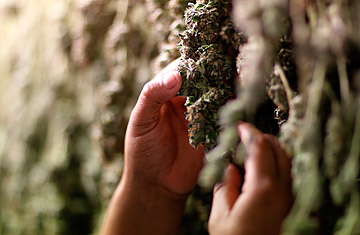
In 1996, California became the first U.S. state to legalize medical marijuana. Since then, 13 other states and the District of Columbia have done the same
The cult movie Reefer Madness, released in 1938, warned of the horrors of marijuana — or, as a movie poster put it, "the torturer that never stops." The film was an extreme portrait, full of death and rape and depravity, but it was only an exaggerated version of the real fears America long had about marijuana. Yet in recent years, as medical use of marijuana has gained acceptance and the backing of the law, that century-old national consensus has slowly broken down. And now, this election season, it could completely shatter, starting in California.
Next month, Californians will vote on Proposition 19: the Regulate, Control and Tax Cannabis Act of 2010. Prop 19 would make recreational use of marijuana entirely legal — and allow cash-strapped cities to raise funds by taxing it. Completely legalizing pot may sound like a radical idea, but not to the people who are actually going to decide: the latest Public Policy Institute of California poll found that 52% of likely voters support Prop 19, with just 41% who oppose it.
In fact, Prop 19 is polling better than Senator Barbara Boxer or her Republican opponent, Carly Fiorina. It is also outpolling the gubernatorial candidates, Democrat Jerry Brown and Republican Meg Whitman. It is gaining support as the election grows nearer — and it has the backing of the state Service Employees International Union, perhaps the state's most powerful union.
Even if the Prop 19 does not pass, there is not much left to the laws against marijuana in California. More than three decades ago, the state decriminalized possession of small amounts of pot, making it a misdemeanor punishable by a fine. Last week, Governor Arnold Schwarzenegger took decriminalization a big step further: he downgraded possession of an ounce or less of pot to an infraction. That means that someone caught with as many as 30 joints will soon get traffic-ticket-level punishment — and no criminal record.
California is not only the largest state, it is the place where social movements begin, and it has led on marijuana policy before: it was the first state to legalize medical marijuana, in 1996, and since then, 13 states and the District of Columbia have followed. Already, a group in Colorado is working to put a Prop 19–like referendum on the ballot there in 2012. A poll of Coloradoans found that 49% favored legalizing and taxing marijuana, with just 39% opposed.
One of the main arguments for rethinking marijuana laws is economic. A new study by the libertarian Cato Institute found that turning cannabis into a regulated commodity would save $8.7 billion in law-enforcement costs annually, while generating $8.7 billion in revenue.
